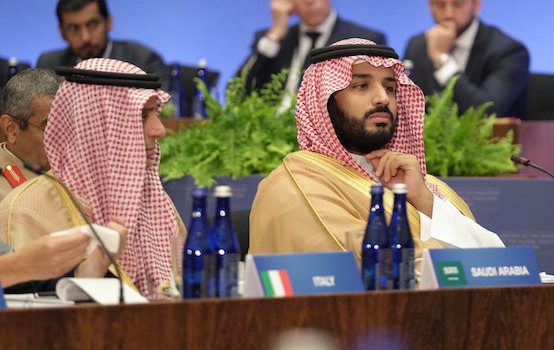The Saudis Launch Another Reckless War

The Saudis just tanked the oil market as part of their intra-OPEC feud with Russia. U.S. oil producers are going to suffer as a result:
Saudi Arabia had pushed last week for a steep cut in production by OPEC countries and by those oil producers in league with OPEC, particularly Russia. The idea was to prop up prices in the wake of a global decline in demand because of the epidemic of covid-19, the disease caused by the novel coronavirus. But Russia balked, not wanting to give up market share, and over the weekend, the Saudis turned 180 degrees.
They are now moving to flood the market with hundreds of thousands of barrels of additional oil per day and offering steep discounts to refineries around the world.
Analysts fear the move is the beginning of a price war between the Saudis and Russia — which will squeeze American shale oil producers as prices are heading sharply downward.
The Saudi move will inflict some pain on Russia, but they are cutting off their own nose to spite their face. Flooding the market with more oil hurts the Saudi government’s revenues at a time when they need all the revenue they can get. This is something they cannot afford to do for very long. Like so many other Saudi government actions over the last few years, this was an ill-considered and reckless gamble that is likely to blow up in their face. The Saudi break-even point is higher than it is for any other major oil-producing state. The Saudis need an oil price above $80 per barrel, and the Russians can get by at almost half that.
In the U.S., the collapse in oil prices will have a negative effect on the local economies that depend heavily on energy, and along with the effects of the outbreak on the broader economy these parts of the country will be harder hit than most. Our “ally” has just taken aim at undermining an important part of the U.S. economy at a critical time. Maybe this will help drive home the message that the U.S. owes Saudi Arabia nothing and should stop supporting them.
Once again, Mohammed bin Salman has started a war he cannot win. David Fickling explains:
The bigger problem for Saudi Arabia is that even a withdrawal of shale production will leave the fragile truce it’s enjoyed with Russia in tatters, just as the prospect of a plateau and peak in oil demand looms ever closer.
Riyadh’s race-to-the-bottom strategy only worked in 1985 because it was the lowest-cost producer. Now, its bloated budget means that it’s one of the highest-cost and shakiest players [bold mine-DL]. It remains embroiled in a costly and brutal military quagmire in Yemen, and on Friday arrested senior royals on the grounds they were plotting a coup.
More than four years after Prince Mohammed Bin Salman began the economic reforms that were intended to diversify the economy’s dependence on crude, the prospect of prices ever returning to fiscal breakeven levels looks even more remote. Even Saudi Aramco shares are now trading below their offer price.
Countries embarking on wars often expect they’ll be over in a few months, only to discover their opponents were stronger than they thought. Should this turn into a prolonged fight, Moscow is unlikely to be the first player to fold.
Like the war on Yemen, which has been Mohammed bin Salman’s signature policy for the last five years, this price war is ill-considered, likely to drag on much longer than the crown prince expects, and ultimately ruinous.
Comments